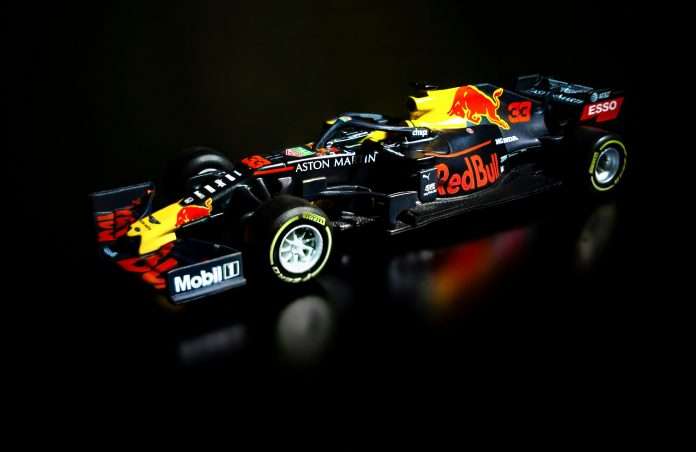From iconic liveries to memorable, yet farcical characters, Formula One has a rich, colourful, and yet troubled past with sponsors. With global brands such as Marlboro, Vodafone, and Petronas weaving their way into the annuls of the sport’s history, it is no surprise that many FinTechs have tried to do so too. Renowned names, in the form of Visa and Cash App, being the latest, as they penned a controversial deal to rebrand Alpha Tauri under a new guise and moniker: Visa Cash App RB Formula One Team. Ahead of the 2024 season, FinTech Global investigates whether there is any correlation between performance on track – and success in the business world.
Visa Cash App RB (RB) hasn’t turned a wheel in anger yet on the circuit since its aforementioned rebrand, and yet, prior to launching the VCARB 01 earlier today (February 9), it has become one of the most controversial and vigorously discussed topics over the winter.
Initially touted to be renamed Racing Bulls, a name which was greatly chastised by fans and experts alike, the squad went one-step further, turning their once storied team-name into a glorified walking billboard by dropping the ‘official’ constructor name down to just RB – giving their new title sponsors even greater exposure.
Indeed, the Faenza-based outfit was once famed as one of Formula One’s greatest privateers in the form of Minardi – the team which gave Fernando Alonso, Mark Webber, and Giancarlo Fisichella their Grand Prix debuts, to name but a few.
But Giancarlo Minardi’s operation has long been torn up, more recently it has ploughed on as the plucky, yet loveable Toro Rosso squad, before completing its metamorphism to Alpha Tauri – the tag it raced on under until the end of 2023.
So, while the fairytale run of Minardi had long been stripped back, many saw this transition as a step too far, prompting Edd Straw of The Race to label the rebrand as “the worst team-name in F1 history.”
But despite the setbacks, the newly-monikered operation has taken a giant leap to restoring its reputation in the eyes of the viewer. At 06:15 am February 9 (GMT) RB launched their 2024 machinery to much acclaim.
A striking blue and white livery was the recipe for success, akin to Toro Rosso’s design from 2017-2019, it became a double PR coup due to the vast amounts of dull carbon fibre that the squad’s rivals had already shown off this season – making the VCARB 01 a positively garish contribution to the F1 grid.
So, whilst the partnership has had a rocky start in regard to its PR – there is certainly time for it to become the latest FinTech success story in the sport – particularly when the partaking brands are so excited about the opportunity, as Catherine Ferdon, Head of Brand at Cash App told FinTech Global.
She said, “We’re thrilled to embark on this journey with Visa and Red Bull. The Visa Cash App RB team and Cash App are dedicated to connecting people and communities, and there’s no greater unifier than sports. With the continued growth of Formula One in the US, this sponsorship allows us to deepen our relationship with Formula One fans and furthers Cash App’s commitment to supporting and growing the culture of F1 fandom in the United States while offering more value to our customers. We have a history of elevating emerging talent and look forward to sponsoring a team known for developing incredible up-and-coming drivers.”
So, both Cash App and Visa will be hoping for greater brand exposure and PR out of this lucrative deal, but what does the history tell us? Will on-track success directly corroborate with success in the boardroom? FinTech Global has picked out five examples from the history books to give you an indicator.
- Moneytron
Belgian investment firm Moneytron was one of the foremost examples of FinTech investment in the sport. In 1989 the firm, thanks to its eccentric owner Jean-Pierre van Rossem, who took a major shareholding in Onyx over the 1989 season, as per Autosport.
The firm claimed it could offer endless returns on investment, with Van Rossem, a well-known Marxist figure, asserting that he had devised a statistical model capable of forecasting stock market behaviour, aiming to outsmart the capitalist system.
The enigmatic figure’s powers of persuasion were so large that allegedly, even the Belgian royal family were a part of the company’s customer base.
On track, Onyx punched well above their minnow status, snagging points in only their seventh race, through Stefan Johansson. Later that year, the Swede gave the outfit its highest of highs, holding on after a strategy gamble to bring them their sole podium finish at the Portuguese Grand Prix.
The champagne poured, and for Moneytron and Lola, and all seemed well, however this was short-lived.
Verdict: Limited on track success didn’t correlate to success in the business world
2. Mastercard
In 1997, global payment giant Mastercard made a significant foray into Formula One sponsorship by becoming the title sponsor of the short-lived Lola outfit.
As per Motorsport.com, the impetus behind the project stemmed from Mastercard’s keenness to introduce the ‘F1 Club’ for cardholders, intended to provide funding for the team.
This resulted in a rushed timeline, with the project being launched approximately one year ahead of the original schedule. Meanwhile, banking competitor HSBC was entering Formula 1 alongside the new Stewart Grand Prix team, benefiting from a full year of preparation and securing a long-term works support deal with Ford.
Making its debut at the 1997 Australian Grand Prix, the British team’s dream became a nightmarish proposition overnight, as lead driver Vincenzo Sospiri qualified a full eleven seconds off the pace – meaning that they faced the ignominy of failing to qualify.
The team turned up again at Interlagos for the Brazilian Grand Prix, but unfortunately the Lola squad was seriously in debt – to the tune of £6m – and they never raced again, as the doors firmly shut on the fledgling operation.
Yet, amidst the disappointment on the racetrack, Mastercard managed to salvage their branding efforts off-circuit. During this time, they introduced the iconic “Priceless” marketing campaign, the slogan of which, “There are some things money can’t buy; for everything else, there’s Mastercard” quickly became synonymous with the brand’s ethos and remains a central part of their marketing strategy to this day.
Verdict: Mastercard took pole position in the boardroom despite this move
3. Darktrace
Darktrace, a prominent figure in cybersecurity AI on a global scale, provides comprehensive AI-driven solutions as part of its mission to eliminate cyber disruptions worldwide.
Not only emblazoned on McLaren Formula One cars since 2020, Darktrace has become a key component of the Woking-based outfit’s operation on a day-today basis. The brand’s state-of-the-art AI technology offers a formidable defence against cyber threats. This groundbreaking innovation empowers partners such as McLaren, enabling them to propel forward with unprecedented speed and efficiency, all while safeguarding against potential disruptions.
On track, McLaren recently had their best season in the sport for many a year, as Andrea Stella’s team fired back following a tough start to 2023 – securing nine podiums – as well as a sprint race triumph.
But what about Darktrace’s triumphs off track? Well, the Cambridge-based firm was named one of Fast Company’s ‘10 Most Innovative Companies in Artificial Intelligence’ for 2022. On top of this, Darktrace’s latest half-year results have revealed revenue growth of more than 27% to nearly £260m, according to BusinessCloud.
Verdict: A front-row lockout for this partnership
4. FTX
In September of 2021, Mercedes AMG-Petronas Formula One Team penned a deal with crypto giants FTX to see the brand appear on its car on a multi-year deal.
The Brackley-based squad were defending Constructors and Drivers Champions at the time – having dominated the sport in an unprecedented spree since the 2014 regulation changes. However, despite being pipped to the post by Max Verstappen in controversial fashion at the end of the campaign, Mercedes still took home the Constructors crown – with FTX displayed on the car throughout this success story.
However, on-track success slipped as we headed into 2022, as the Silver Arrows struggled to get to grips with the new era of ground effect cars – and were duly left in the dust by Ferrari and Red Bull.
Perhaps this was a bad omen, as by November of that year, FTX had gone bust, with Mercedes left in disbelief, according to Autosport.
Verdict: Struggles on track, capitulation off it
5. Moneygram
The newest entry on this list, The Dallas-based interstate and international peer-to-peer payments firm became the title-sponsor of the Haas F1 team ahead of the 2023 campaign.
The Kannapolis squad performed poorly throughout the season, finishing last in the World Constructors Championship – only notching up points finishes on three separate occasions. With 12 points scored, a little to nothing to write home about, Haas and Moneygram’s partnership is still going as we head into 2024.
Off the track, Moneygram has had a promising 2023 by the numbers. The firm reported a 3.6% YoY increase in its money transfer revenue to $294.8m in Q1 2023, highlighting its potential in the market, according to FX Intelligence.
Despite this, it wasn’t all sunshine and roses for the company – similar to that of the Haas squad. The firm was caught up in a scandal that has most-recently seen the U.S. Postal Inspection Service approve the disbursement of over $500,000 to 50 victims, as part of the compensation process to victims defrauded through the use of MoneyGram money transfers. These victims will recover their full loss amounts, as per the Moneygram Remission.
However, despite the clear comparison with Haas’ own PR struggles in recent years through hiring Nikita Mazepin and his father’s alleged links to the Russian oligarchy, it is too early to say if the partnership will produce similar results off-track – to on it.
Verdict: Too early to tell
Keep up with all the latest FinTech news here.
Copyright © 2024 FinTech Global











